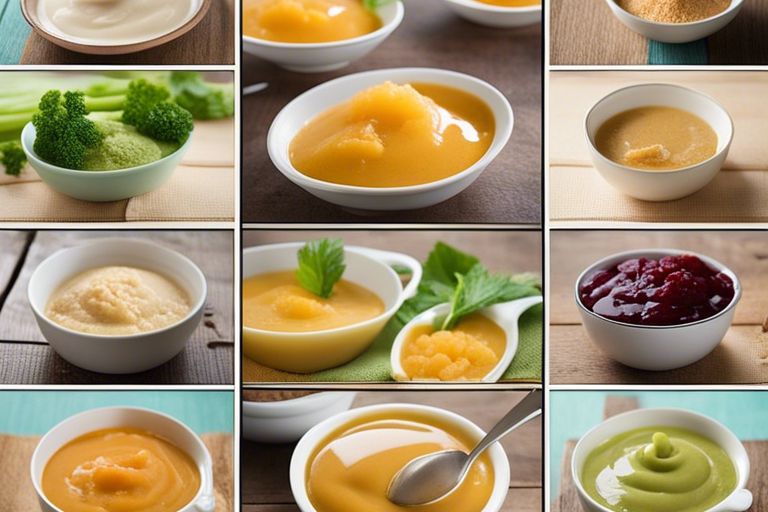tips, tricks and guides for parenthood
Many parents strive to provide their little ones with the best start in life, and that includes feeding them nourishing, homemade baby food. By preparing organic, homemade meals for your baby, you can ensure they are getting nutrient-dense food without any additives or preservatives. From pureed fruits and vegetables to wholesome grains and proteins, there are endless possibilities for creating healthy, delicious meals for your baby right in your own kitchen. Join us on a journey to discover easy, nutritious recipes that will support your baby's growth and development in the best possible way.
Even though it's an exciting milestone, introducing solids to your baby should be approached with caution. Determining readiness for solids involves observing if your baby can sit up with support, has good neck control, shows interest in food, and has lost the tongue-thrust reflex. Always consult your healthcare provider before starting solids.
Purees are an ideal way to introduce your baby to solids. Starting with purees and mashes can help your baby transition from a liquid diet to more solid foods. Simple fruits like mashed banana or steamed vegetables like carrots are great first options. Remember to introduce new foods one at a time and watch out for any allergic reactions.

It's necessary to introduce your little one to a variety of vegetables to ensure they get a wide range of nutrients. Seasonal selections such as sweet potatoes, carrots, and peas are not only packed with vitamins and minerals but also bursting with natural flavours that your baby will love. These vegetables are rich in necessary nutrients like vitamin A, vitamin C, and fibre, which are crucial for your baby's growth and development.
Sweetness and natural sweetness from fruits can add a delightful twist to your baby's meals. Fruits like apples, bananas, and pears are not only delicious but also nutrient-dense, providing your baby with a wide array of vitamins and antioxidants. When introducing fruits, remember to mash or puree them to avoid any choking hazards and make it easier for your baby to digest.
Introducing your little one to new flavours is an exciting journey. Start with mild tastes like mashed avocado or steamed sweet potato and gradually progress to more complex flavours like spinach and pear puree. Do not forget, introducing a variety of tastes early on can help develop your baby's palate and make them more open to trying different foods as they grow.
With finger foods and baby-led weaning, your baby can explore textures and develop their fine motor skills while enjoying mealtimes. Offer soft cooked vegetables like carrot sticks or broccoli florets, ripe fruit slices, or cooked pasta shapes for them to self-feed. Always ensure foods are cut into safe sizes to prevent choking hazards and supervise your baby closely during mealtimes.
This hands-on approach encourages independence and helps your baby to learn how to chew and swallow different textures. Embrace the mess and let them explore food at their own pace, making mealtimes a fun and enjoyable experience for both of you.
Once again, for more Homemade baby food and puree recipes, it is crucial to ensure that your baby's meals are nutritious and delicious. Meal planning and preparation can make the process smoother and more efficient.
With organic and homemade baby food, it's important to store it properly to maintain freshness and quality. Ensure that you use airtight containers or freezer bags to store portions, label them with dates, and rotate stock to use the oldest first. Avoid refreezing thawed food and always defrost in the fridge. Thou, always check for signs of spoilage before feeding your little one.
To simplify your life and ensure your baby is getting nutritious meals every day, consider setting aside some time each week for meal prep. Meal planning can help you save time and reduce stress during busy weekdays. Whether you batch cook and freeze meals or prepare ingredients in advance, this routine can be a game-changer for busy parents.
Considering all points, it is clear that organic and homemade nutritious baby food recipes are a great choice for parents who want to provide their little ones with the healthiest start in life. By using fresh, locally sourced ingredients and avoiding harmful chemicals and preservatives, these recipes offer a wholesome and nutritious alternative to store-bought baby food. With a little time and effort, parents can easily prepare delicious and healthy meals for their babies, ensuring they receive all the important nutrients they need for optimal growth and development. Making your baby's food at home not only gives you control over what goes into their meals but also allows you to introduce them to a variety of flavours and textures from an early age. Embracing organic and homemade baby food recipes is a wonderful way to promote a lifelong love of healthy eating and set the foundation for a lifetime of good nutrition.
A: Homemade baby food allows you to control the ingredients, ensuring your little one gets nutritious and fresh meals without any preservatives or additives.
A: Yes, using organic ingredients ensures that your baby is consuming food free from harmful pesticides and chemicals, promoting better health and wellbeing.
A: Homemade baby food can be stored in airtight containers in the fridge for up to 3 days or frozen in ice cube trays for convenient portioning and quick meals.
A: Nutritious ingredients for homemade baby food include fruits, vegetables, grains, and proteins like avocado, sweet potatoes, quinoa, and lentils, providing a variety of crucial nutrients.
A: It is generally recommended to start introducing solids to your baby's diet around 6 months of age, when they show signs of readiness such as good head control and a willingness to eat. Always consult your healthcare provider for personalised advice.